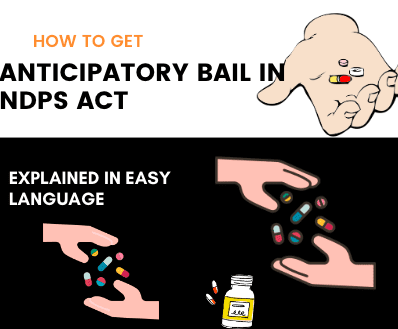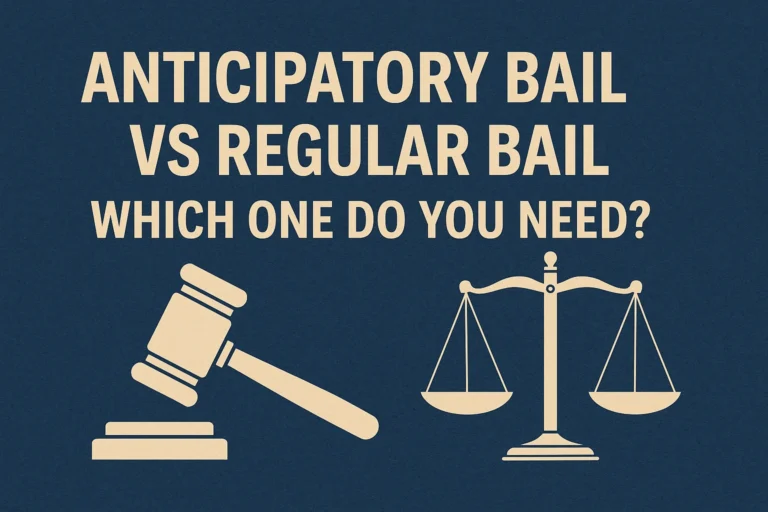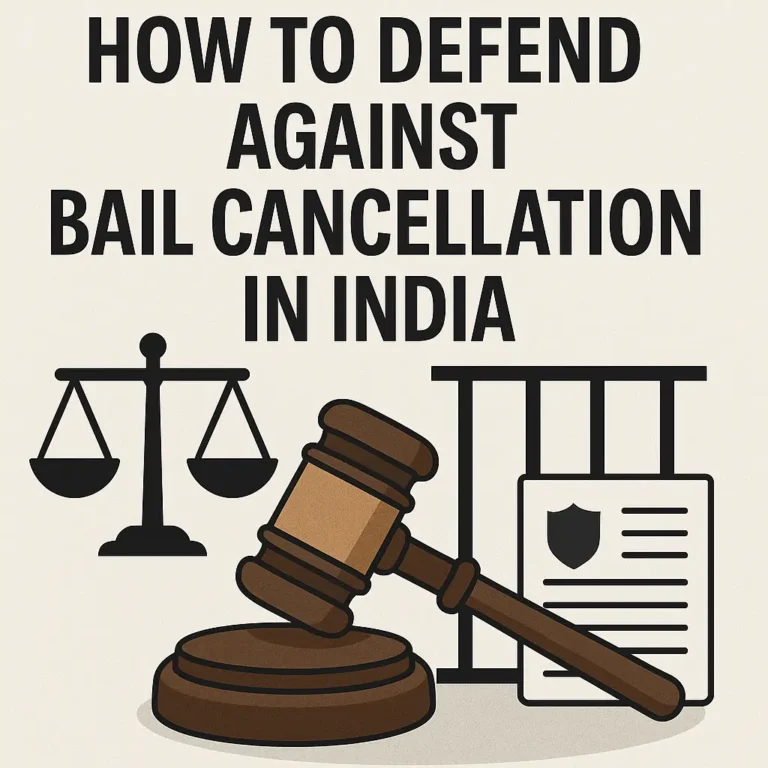
How Difficult it is to get Anticipatory Bail in NDPS Act must be in everyone’s mind. But here in this article, Vishal Saini Advocate has clearly explained provisions of law that are helpful for an ordinary person to understand requirements related to bail.
Introduction:-
Anticipatory bail is a type of bail that can be sought in cases related to the Narcotic Drugs and Psychotropic Substances Act (NDPS Act). It is a legal remedy available to individuals who are anticipating arrest on charges related to the NDPS Act. The purpose of anticipatory bail is to prevent the arrest of an individual, allowing them to remain at liberty while they challenge the validity of the charges against them.
Under the NDPS Act, the possession, cultivation, production, sale, and distribution of certain controlled substances are criminalized. The Act also imposes stringent penalties, including imprisonment and fines, for violations of its provisions. Given the severe consequences of an NDPS Act conviction, it is important for individuals who are facing charges to be able to defend themselves effectively.
To obtain anticipatory bail, an individual must file an application with the appropriate court. The court will consider the application based on the circumstances of the case, including the nature of the allegations and the likelihood of the applicant absconding or tampering with evidence. If the court grants anticipatory bail, it will issue an order directing the police to release the applicant on bail if they are subsequently arrested.
The Code of Criminal Procedure 1973 (CrPC) is the legislation that governs the administration of criminal proceedings in the country. It was enacted in 1973. Offences are classified into two based on their bailable nature, i.e., bailable offences and non-bailable offences. A crime in simple language is an act or an omission prohibited by law. The concept of bail is still controversial in our country because the public feels the accused might flee after issuing bail. There are three types of bail: regular bail, interim bail, and anticipatory bail. This article briefly discusses the concept of anticipatory bail and essential case laws decided in its regard by the Supreme Court.
Bail Definition:-
The term bail is not defined anywhere in the Code of Criminal Procedure. In general, bail is defined as a process of releasing an accused for a sum, and it is also a promise that he will be attending the Court proceedings in the future.
If a person has committed a bailable offence, he can demand bail as per provisions given in section 436 CrPC, and he needs to submit a “bail bond” before the concerned Court, which contains the terms and conditions on which a person will release on bail. Any person on bail should stay within the Court’s territorial jurisdiction or should act as per conditions imposed by the Court. A further person released on bail shall not commit an offence similar to the offence in which they are accused.
You can also read : BAIL IN AFEEM CASES IN INDIA
Bailable Offence
Section 436 CrPC talks about in what cases bail to be taken as per 436 of CrPC, whenever a person accused of a bailable offence is arrested without a warrant and is willing to give bail, they must be released on bail. The discretion to decide the bail amount lies with the officer or the Court. However, it is pertinent to mention that the court can’t exercise its discretion illegally on the amount of bail as in a case latest case “The Punjab and Haryana high court has set aside a bail bond condition of ₹100 crores imposed by a Faridabad court on a developer in a cheating case “
Aasu v. the State of Rajasthan (2017)
Facts of the aforesaid case: All four accused are booked under Section 302 R/w Section 34 of the Indian Penal Code. The lower court granted anticipatory bail for all the other co-accused. The petitioner in the instant case also applied for anticipatory bail, which was not decided for a long time, and Hence he challenged the same in the Rajasthan High Court.
Issue: Whether there is a prescribed time limit that a court shall dispose of bail applications?
Judgement: The Court has delivered a judgement that all the bail applications shall be disposed of within a week of filing.
Types of Bail:-
- Anticipatory Bail
- Interim Bail
- Regular Bail
1. Anticipatory Bail:-
Anticipatory bails are taken before the arrest of a person. It is also called a pre-arrest bail. It is mentioned under Section 438 of the Code of Criminal Procedure as ‘grant apprehending arrest’. The requirement for anticipatory bail saw a rise in the early 1990s when many false cases were filed against business people. To protect the interests of the public, the Law Commission has suggested adding a provision prohibiting arrest beforehand. As it is a matter of the personal liberty of a man, it was added to the Code.
According to Section 438 of CrPC, a person who has committed an offence anticipates his arrest, wherein he can approach the High Court or the Sessions Court for anticipatory bail. It is at the discretion of the Court whether to grant bail or reject the same. It solely depends on the circumstances and the seriousness of the offence. Anticipatory bail can be granted for a non-bailable offence. It will be valid only if the person has no direct connection or when the Court believes that the person is innocent.
2. Interim Bail:-
Interim bail is given by direct order of the Court to release an accused for a short term temporarily. The Courts noticed that interim bails are being misused in many cases and have decreased the number of interim bails issued. Interim bail is issued so the accused can cooperate with the investigation agency.
3. Regular Bail
An arrested person in police custody can apply for regular/daily bail. Bail provisions are given under Sections 437 and Section 439 of the Code of Criminal Procedure.
Cancellation of Bail:-
The Court granting bail can also withdraw the concession of bail given to a particular accused/s, either suo moto, i.e. on its own, or on the Application from the Police/ Complainant/ any other aggrieved person. However, the Courts exercise their power to cancel bail with care and circumspection.
Anticipatory Bail In NDPS Act
First, you need to find the Best Lawyer for NDPS cases. You can read this article about the best advocate’s qualities or How to Find the Best Advocate. Since the advocate plays an excellent role in bail. However, facts are different from case to case
We get Anticipatory bail in ordinary cases, in the same way, we can get anticipatory bail in NDPS Act cases.
Below is the procedure explaining in easy steps how to get bail in NDPS Act cases
First of all, you need to keep in mind that as per section 37 (1) of The Narcotic Drugs and Psychotropic Substances Act, 1985 all offences in the act are cognizable. The Narcotic Drugs and Psychotropic Substances Act, of 1985 provides deterrent punishments for drug trafficking offences. Even though the significant crimes are non-bailable by the level of sentences, drug offenders can also be released on bail on technical grounds.
But in the Case of Teru Majhi and another Vs. State of West Bengal and others 2014(2) RCR (Criminal ) 886
It was held that a Special Court constituted under section 36 of the NDPS Act is competent to entertain the pre-arrest bail under section 438 CrPC
In Atik Ansari Vs. The State of NCT Delhi, 2006(4) RCR (Cri). 857 Delhi
Interim bail in the NDPS Act for the operation of the wife 2 weeks was granted. Further, it is pertinent to mention that here in this case 2.5 Kg of heroin was recovered.
Advantages of Obtaining Anticipatory Bail in NDPS Act Cases
There are several advantages to obtaining anticipatory bail in NDPS Act cases. First, it allows the applicant to remain at liberty while they prepare for their defense. This can be especially important in cases where the applicant is unable to secure regular bail due to the severity of the charges or other factors. Second, it can provide a measure of protection against arbitrary or malicious arrests. In some cases, individuals may be falsely accused of NDPS Act offenses, and anticipatory bail can help to ensure that they are not wrongly incarcerated.
Conclusion:-
In conclusion, anticipatory bail is a valuable legal remedy for individuals who are facing charges under the NDPS Act. It allows them to remain at liberty while they prepare for their defence and can provide protection against arbitrary or malicious arrests. If you are facing NDPS Act charges and are considering seeking anticipatory bail, it is important to consult with a qualified lawyer who can advise you on the best course of action.
FAQs (Frequently Asked Questions)
Q.How much time does it take to get Anticipatory Bail in NDPS Act cases?
A.Time is not fixed for a case for bail. However, the general procedure is once we File Anticipatory Bail the court first issue notice to the Public Prosecutor and hear him then decide bail on the merits
Q.How to get Bail in NDPS Act cases for small quantities?
A. It’s easier to get bail in case of a small quantity than a commercial quantity. As it involves small risks.
Q. How to get Bail in NDPS Act cases for Commercial Quantity?
A.Section 37 of the NDPS Act stipulates that persons accused of offences under the Act involving commercial quantity, shall not be released on bail unless the Court is satisfied that there are reasonable grounds for believing that the accused is not guilty and is not likely to commit any offence while on bail
Q. Can Magistrate Grant Bail in NDPS Act Case?
A.As per Section 36 of the NDPS Act offences are decided by a special court and Hence a magistrate’s court has no jurisdiction to entertain a bail application for an offence with prescribed punishment of more than three years under the Narcotic Drugs and Psychotropic Substances (NDPS) Act as it is triable by a special court.
Q.What is anticipatory bail in the NDPS Act?
A. Anticipatory bail in the NDPS Act refers to the grant of bail before arrest to a person who has reason to believe that they may be arrested for an offense under the Narcotic Drugs and Psychotropic Substances (NDPS) Act.
Q.How can I apply for anticipatory bail under the NDPS Act?
A. An application for anticipatory bail under the NDPS Act can be made to the High Court or the Sessions Court. It should be done through a lawyer, who will submit the application on your behalf.
Q. What are the grounds for granting anticipatory bail under the NDPS Act?
A. The grounds for granting anticipatory bail under the NDPS Act include the likelihood of the accused’s presence at trial, the strength of the prosecution’s case, and the possibility of the accused fleeing or tampering with evidence.
Q. Can anticipatory bail be granted in a case under the NDPS Act?
A. Yes, anticipatory bail can be granted in a case under the NDPS Act, but it is up to the discretion of the court and the circumstances of the case.
Q.How long does it take to get anticipatory bail in an NDPS Act case?
A. The time it takes to get anticipatory bail in an NDPS Act case can vary depending on the court’s schedule and the complexity of the case. It can take several weeks or months.
Q.What happens if anticipatory bail is granted in an NDPS Act case?
A. If anticipatory bail is granted in an NDPS Act case, the accused can be released on bail before arrest. They will have to comply with the conditions set by the court and appear at trial.
Q. Can anticipatory bail be cancelled in an NDPS Act case?
A. Yes, anticipatory bail can be cancelled in an NDPS Act case if the accused violates the conditions of bail or if new evidence emerges that justifies their arrest.
Q. What are the conditions for anticipatory bail in an NDPS Act case?
A. The conditions for anticipatory bail in a NDPS Act case can include surrendering of passport, reporting to the police station, not leaving the country without permission and not tampering with evidence.
Q. Can I appeal if my anticipatory bail application is rejected in an NDPS Act case?
A. Yes, you can appeal if your anticipatory bail application is rejected in an NDPS Act case.
Q. Can a person be arrested during the pendency of an anticipatory bail application in NDPS Act case?
A. Yes, a person can be arrested during the pendency of the anticipatory bail application in a NDPS Act case, but it is subject to the discretion of the police and the court.
Q. Can a person be granted anticipatory bail in the NDPS Act case if he is an absconder?
A. It is subject to the discretion of the court. The court can consider factors like the likelihood of the accused’s presence at trial, the strength of the prosecution’s case, and the possibility of the accused fleeing or tamper with evidence.
Q. Can a person be granted anticipatory bail if he is charged with a repeat offence under NDPS Act?
A. It is subject to the discretion of the court. The court can consider factors like the likelihood of the accused’s presence at trial, the strength of the prosecution’s case, and the possibility of the accused fleeing or tamper with evidence.
Q.How does the court decide on the application for anticipatory bail under NDPS Act?
A.The court will consider factors such as the nature of the allegations, the likelihood of the accused’s presence at trial, the strength of the prosecution’s case
Sources:-
















